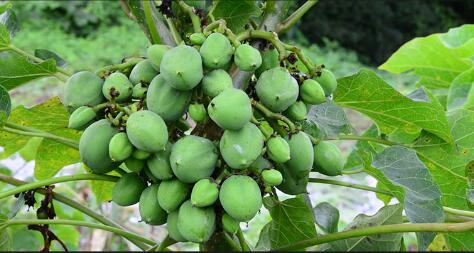Jatropha curcas, a woody oil plant of the Euphorbiaceae family, is used as a model material for studying perennial woody plants due to its well-completed genomic information and stable genetic transformation technology. The hormone that confers fertility to plants—gibberellin (GA)—sometimes inhibits flowering under certain conditions. This phenomenon has long puzzled botanists. However, the intrinsic mechanism by which gibberellin inhibits flowering in perennial plants is currently unclear.
In a study published in Plant Science, researchers from Xishuangbanna Tropical Botanical Garden (XTBG) tried to elucidate the mechanism by which gibberellin regulates the flowering of Jatropha curcas. Through the application of GA, the overexpression of GA oxidase genes and genetic complementation experiments, they investigated whether GA plays a key role in the regulation of flowering time in J. curcas.
The results showed that by overexpressing the gibberellin synthesis gene JcGA20ox1, the flowering of Jatropha curcas can be delayed, while overexpression of the gibberellin degradation gene JcGA2ox6 will lead to an earlier flowering time. Gibberellin delayed flowering by inhibiting flowering-related genes such as JcFT, and overexpression of JcFT can restore flowering.
Through hybrid experiments, they also found that JcGA20ox1 inhibited floral transition in the J. curcas × J. integerrima hybrid. Overexpression of one of the JcGA20ox1, JcGA2ox6, or JcFT genes reduced both the seed and kernel oil content. Overexpression of JcGA20ox1 or JcGA2ox6 decreased annual seed yield, whereas JcFT overexpression increased annual seed yield, and the JcFT gene partially rescued the decrease in annual seed yield caused by overexpression of JcGA20ox1 or JcGA2ox6.
The study revealed that gibberellin inhibits the flowering of Jatropha curcas through JcFT and demonstrated the effects of JcGA20ox1, JcGA2ox6, and JcFT on agronomic traits.
"Our study pointed out the potential value of gibberellin metabolic genes and JcFT in breeding new varieties of woody oil plants. It also uncovered the mystery of "flowering" in plant growth, providing new ideas for breeding better plant varieties in the future," said TANG Mingyong of XTBG.
Contact
TANG Mingyong Ph.D Principal Investigator
Key Laboratory of Tropical Plant Resources and Sustainable Use, Xishuangbanna Tropical Botanical Garden, Chinese Academy of Sciences, Menglun 666303, Yunnan, China
E-mail: tangmingyong@xtbg.ac.cn
First published: 26 April 2024

Jatropha curcas (Image by TANG Mingyong)

